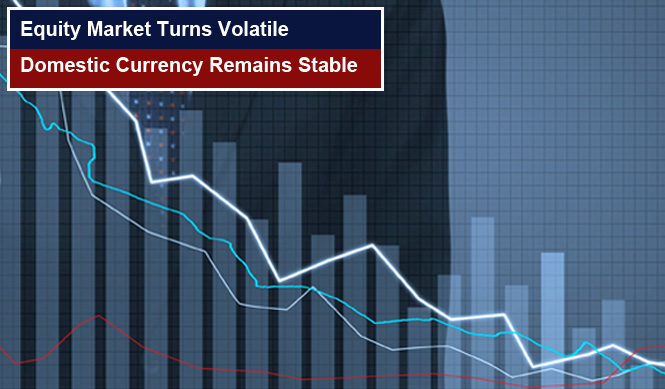Markets This Week
For a second consecutive week, the equity markets of India saw a sharp drop and closed in the red. A drop in power, realty, and capital goods is the reason behind the fall in key indices, experts believe. The 30 scrips S&P BSE Sensex closed 242.22 points (0.849 percent) lower than last week at 28,261.08 points (last week’s closing 28,503.30 points). The 50 scrips CNX Nifty also dipped by about 76.85 points (0.888 percent) to close at 8,570.90 points (last week’s closing 8,647.75 points).
Among the sectoral indices the top losers this week were the S&P BSE Realty Index which slipped about 3.5 percent, the BSE Power Index which declined 3.5 percent, and also the BSE Capital Goods Index which declined by about 1.8 percent. Among the Nifty fifty, top losers were JSPL (decline of 11.6 percent), NTPC (decline of 8.7 percent), Bharti Airtel (decline of 5 percent), HUL (decline of 4.8 percent), Mahindra & Mahindra (decline of 5 percent), and Sesa Sterlite (decline of 4.1 percent). According to data released this week, Foreign direct investment (FDI) in India grew by over 100 percent to about USD 4.48 billion in January. This is the highest FDI inflow in the past 29 months. IMF’s praise of the Indian economy definitely cheered the corporate world. Christine Lagarde, the MD of International Monetary Fund (IMF), called India’s economy a bright spot in the global landscape. Economists believe that a downslide despite positive cues such as RBI’s rate cut and a negative WPI is likely to mean that the markets shall remain bearish through this quarter and perhaps the next as well. While retail investors are looking at Q4 results starting 1 April, India Inc does not seem to be hopeful that the earnings will bring big cheer.
Rajya Sabha Passes Coal, Mine Bills
The Rajya Sabha, the Upper House of Parliament, passed the much-hyped Mines and Minerals (Development and Regulation) Bill and Coal Mines (Special Provisions) Bill on 20 March 2015, despite expectations of opposition from the Congress. A number of opposition MPs broke ranks and favoured the NDA initiated legislation. The Mines and Minerals Bill was passed by the Upper House in a 117 (for) – 69 (against) vote. Later, the Lower House (Lok Sabha) also passed it quickly. The bill now awaits Presidential assent and once that is received, it shall replace an interim ordinance.
The Mines Bill now makes way for the auction of about 199 mines containing about 10 different minerals such as Iron ore, Bauxite, Limestone, and Manganese Ore. About 100 of these mines are likely to be put up for auction in the first phase. The revenue that the government is likely to earn from the auction is not yet estimable. The lease of the mines shall now be for 50 years, instead of 30 years.
The passage of the Coal Mines shall eliminate corruption and subjectivity in allocation of coal blocks, said the Finance Minister, Arun Jaitley. Industry associations Assocham, CII, and PHD Chamber of Commerce and Industry, welcomed the passage and praised the lawmakers of the country.
Inox Wind IPO Oversubscribed 18 Times
In a resounding response to worries that the Initial Public Offers (IPO) market is rather tepid, the INR 700 crore public offering of Inox Wind Ltd. equity was oversubscribed by about 18 times. The public issue of Inox comes right after the uninspiring IPOs by Ortel Communications Ltd and Adlabs Entertainment Ltd. The disinterest of investors in these two had experts wondering if the primary equity market in India would see any excitement this year.
Incorporated in 2009, Inox Wind Ltd. is a manufacturer of wind turbine generators. The company also provides wind resource assessment and infrastructure development services apart from operating and maintaining wind power projects. The IPO was managed by Yes Bank, Axis Capital, Edelweiss, and Bank of America Merrill Lynch.
The public offering was oversubscribed in all categories – HNI, Corporate, Institutional, and Retail categories. Retail investors bid for twice the amount of shares reserved for them while the other categories were oversubscribed by about 35 times.
India Owes Iran $8.8 Billion for Oil
On Friday, the Minister of State for Ministry of Commerce & Industry, Niramala Sitharaman said that India owes Iran about USD 8.8 billion for oil imports. India has run up this bill due to Iran’s inability to access the global banking system following sanctions imposed by the western world. The sanctions were imposed in an effort to dissuade Tehran from pursuing its nuclear programme. Iran had previously been paid through an account held in a UCO Bank, Kolkata. The account belongs to Iranian commercial banks and currently has a balance of about INR 178.955 billion rupees (USD 2.86 billion). Indian oil refineries still need to add over USD 5.943 billion as of February end, 2015.
Negative WPI in February
Data released by the government this week revealed that the wholesale price index (WPI) inflation fell to an all-time low of -2.06 percent. The decline from -0.39% in January has been a fall for the fourth consecutive month and has been attributed to low fuel and power prices (decline of over 14 percent). Food prices, however, rose sharply in February (increase by 7.74 percent). Vegetable prices gained about 15.5 percent while fruit prices rose about 16.84 percent. Consumer price inflation rose from 5.2 percent in January to 5.4 percent in February. Despite the last rate cut by the central bank (RBI), the rise in food prices has had economist worried about the country’s inflation.






